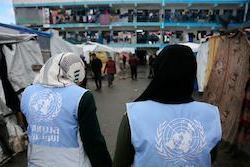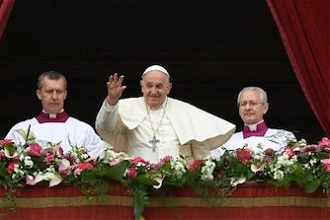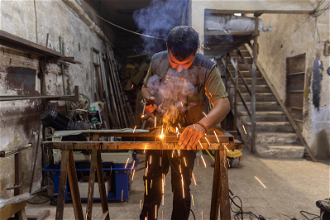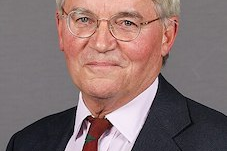London: Faith Matters panel discusses Syria crisis
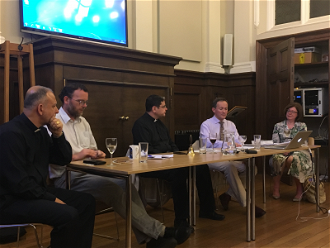
l-r: Rev Nassar, Fr Newell, Fr Robinson, John Pontifex, Melanie McDonagh Image: Weenson Oo
A wide-ranging discussion entitled 'The Crisis in Syria - What Next?' took place at the latest Faith Matters Question Time at Farm Street, Mayfair on 28 June. The panel consisted of journalist Melanie McDonagh who writes for the Evening Standard and the Tablet; Revd Nadim Nassar, the only Syrian priest in the Church of England, and director of the Awareness Foundation; John Pontifex, Head of Press at Aid to the Church in Need, who has visited Syria and Iraq many times, and Fr Martin Newell, CP, peace activist and campaigner.
Participants reflected on how the conflict which began when peaceful demonstrations against president Assad seven years ago, turned into a full-scale civil war - pitching the Sunni Muslim majority against the president's Shia Alawite sect, drawing in Russia, Iran, Turkey, Saudi Arabia, Israel, the UK, US, France and other Western countries and creating a chaotic situation in which jihadis groups such as IS and al-Quada have flourished. More than 400,000 people have been killed, 1.5million people have been severely injured. Cities have been devastated. At least 6.1million Syrians have been internally displaced and another 5.6 have fled abroad.
Fr Nadim and Melanie McDonagh both pointed out that Syria has become a virtual 'dumping ground' for Jihadis who have been pouring in from different parts of the world, with many dying there. Fr Nadim said he was "very disappointed" that the UK government has not taken a stronger stance in helping to resolve the crisis. He said he was also tired of hearing religious leaders describe the situation for Christians in Syria as 'complicated' or seeing them as 'victims of persecution,' - assisting with humanitarian aid, but not standing together to push governments to put an end to the war.
He described how his Awareness Foundation has been training young people to become 'Ambassadors For Peace' in Syria and Iraq. Another of his programmes: Little Heroes runs summer schools for displaced children 'to plant the seeds of love, trust hope and joy in their hearts.'
Fr Martin questioned the motivation of 'the West's' involvement in Middle East conflicts - siding against those countries which happen to be more aligned with Russia. He noted that "arms supplies to the Syrian opposition has led to the fragmenting of Syrian society" - and said Catholic social teaching called for the need to promote a 'just peace', as opposed to a 'just war'. "Peace can only be built on the foundation of a stable and well functioning society. So we need to support programmes that build unity, dialogue, mediation, non-violence training, trauma healing, and economic development, repair and renewal," he said.
"Research and the experience of the last 100 years shows that nonviolent civilian uprisings are more successful than violent ones" Fr Martin added'. "Our role as Christians in the UK, is not to focus on some theoretical plan, but to focus on rebuilding Syrian society from the grass roots, mainly through supporting the heroic Christian communities who have remained.
"The UK along with other countries, acts in its foreign policy based on our own selfish, 'national, strategic interest'. We can only make a positive contribution by changing that, and acting generously."
"Jesus said 'when you hear of war and rumours of war...refuse to join them... flee'. So becoming a refugee is sometimes the only non-violent response possible. If the millions of Syrian refugees had not fled, most of them would probably be dead by now. So as an act of solidarity with them, as our contribution to peace, we should welcome those who have fled, both by financing refugee camps and welcoming Syrian refugees in the UK and in our communities. After all, the Gospel calls us to 'welcome the stranger."
John Pontifex from Aid to the Church in Need expressed concern that the Christian community, who are mostly from eastern-rite Churches, such as the Melkite, Syriac Orthodox, and Greek Orthodox Churches is disappearing. Aleppo, which until 2011 was home to Syria's largest Christian community of 150,000, saw an exodus of faithful, with numbers dropping to barely 35,000 by spring 2017 - a fall of more than 75 percent.
Those who remain there are poor and desperate for work. In many cases people are relying on charity for their food, and the Church has stepped in to help feed those left in Aleppo.
With the civil war raging it was not always clear to what degree attacks on Christians constituted targeted hatred for the minority or to what extent they were motivated by their perceived political allegiance to President Assad, he said. However, throughout the course of the conflict, Sunni jihadist militias have specifically targeted Christians - and indeed other minority groups - and religious hatred has been a key motive. The underlying religious dimension of the attacks was made plain by atrocities committed during the seizure and occupation of Christian villages and settlements. There were reports from some of the Christians who fled Homs in March 2012 that door-to-door campaigns were conducted by jihadists from rebel militias who told Christians to leave the country. The seizure of the Christian village of Sadad at the end of 2013, which saw 45 Christians killed, seems to have been a sectarian attack given its limited strategic importance. 30 bodies were found in two separate mass graves and around 1,500 villagers were used as human shields.
Across Syria, before the war, Christians comprised about 10 percent. Now it is less than five per cent, showing that a disproportionately high number have fled. It is estimated that well in excess of 700,000 Christians have left Syria over the course of the conflict. Christians, who often lived in strategically important zones, fled in large numbers as these areas became caught up in the war, becoming displaced within Syria or seeking refuge outside of the country.
Aid to the Church in Need provides emergency aid, including food, medicine and shelter across 143 local projects run by the Church in Syria, John Pontifex said.
The discussions ended with a prayer and reception.
Farm Street Church raises funds for the Jesuit Refugee Service and Aid to the Church in Need for their work with refugees both in and from Syria. It is also home to a shrine for the kidnapped Jesuit Fr Paolo dall'Oglio SJ and Fr Francis van der Lught SJ, who was murdered in Homs in April 2014. The parish is part of Churches Together in Westminster which has secured the agreement and encouragement of Westminster City Council to resettle 50 Syrian refugees in central London.
LINKS
Aid to the Church in Need annual report: Persecuted and Forgotten - https://acnuk.org/persecuted/
Farm Street Church: https://farmstreet.org.uk



